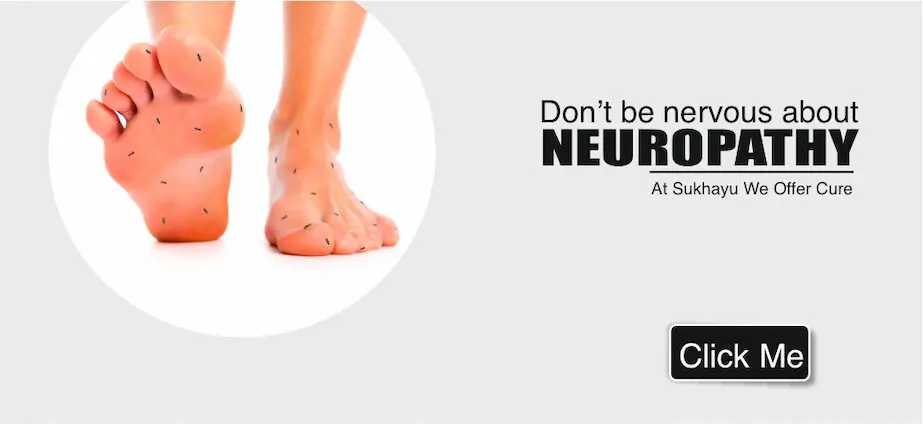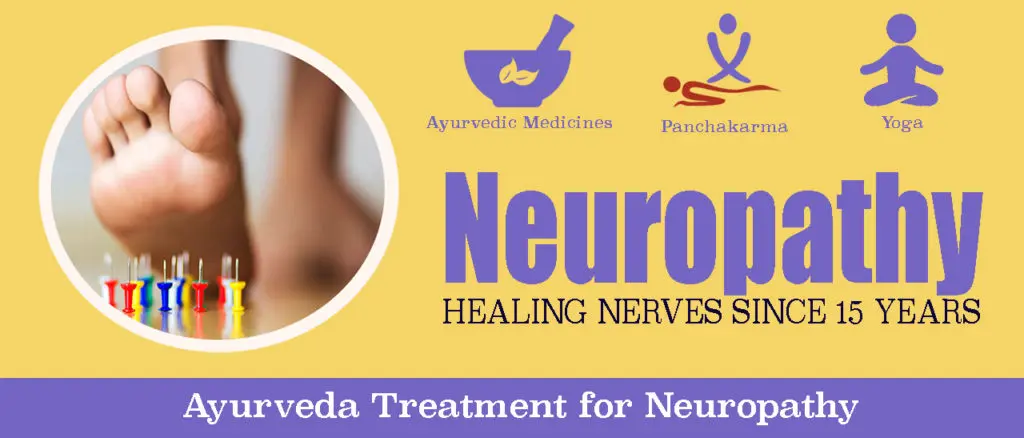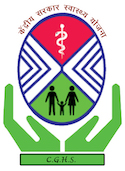| How can Ayurveda Treatment for Neuropathy help | You can get rid of burning, numbness, and paraesthesia easily with Ayurvedic Treatment. The main aim is to restore the myelin sheath of the nerves so that you can lead a normal life without discomfort. |
| Approach for Neuropathy Treatment in Ayurveda | When senses are “over-excited” because of the damage to the nerves because of diabetes, hypertension, or other autoimmune conditions, this results in the aggravation of Doshas. Burning because of Pitta and Tingling due to imbalanced Kapha with Vata. Balancing all three doshas might but tricky but at Sukhayu Ayurved we know this trick. |
| Treatment protocol for Neuropathy? | To balance the doshas, there are two approaches- Ayurvedic Medicines and Panchakarma. The cases of early onset and with fewer complications, we deal with Ayurvedic medicines alone. When it comes to chronic and complicated cases Panchakarma and medicines work well together. |
| Panchakarma Treatment for Neuropathy | For complicated and chronic cases, Panchakarma can help patients with Neuropathy. Basti is the main treatment along with Swedana and Snehana in most cases but Vamana and Virechana in specific doshas aggravation help properly. |
| Ayurvedic Medicines for Neuropathy Treatment | It is not about balancing the Vata dosha alone, therefore we use medicines like – Neurosattava, Ekangveer Rasa, Basant Kusumakar Rasa (In diabetic Neuropathy), or Ossium Powder (in Autoimmune neuropathy). But the selection of medicines is mostly as per the imbalance of the Dosha. |
| The outcome of Ayurvedic treatment | 1. The pain and discomfort diminish completely. 2. Patients can walk normally after ayurvedic treatment of neuropathy. 3. Burning and other complaints diminish completely. 4. You need not continue the medicines for your whole life. |
Treating Neuropathy with Ayurveda
Sukhayu Ayurved has been providing the best possible neuropathy care through ayurvedic medicines and panchakarma over the last 17 years. With an increase in diabetic cases and the outbreak of COVID, we have seen a significant rise in demand for our services over the last 5 years. We are committed to continuing to provide outstanding service and treatment till 2022 and beyond.
Neuropathy is an incredibly debilitating condition that causes pain, disability, and burning or loss of sensation. There are no viable treatment options in conventional medicine, so many people turn to Ayurveda for help. However, it is possible to reverse neuropathy through proper ayurvedic treatment. This article provides details on the disease and its potential treatments.
Neuropathy is a nervous system disorder that causes damage to the nerves. This damage affects how the nerves send information from one area of the body to another. The brain uses cranial nerves, and the spinal cord uses spinal nerves, to send these signals. When there is neuropathic damage, these sensations become impaired or distorted. There are various causes of neuropathy, but before understanding them, it is important to understand how this condition affects the body by causing nerve damage.
The nervous system is two types. Central nervous system and peripheral nervous system.
In case of the neuropathy, nerves outside the central nervous system are affected.
The same condition that appears in the case of the central nervous system is multiple sclerosis, like condition. This is the peripheral nervous system.
Because neuropathy impacts the peripheral nervous system. Therefore it is usually known as peripheral neuropathy also. Before understanding, we need to know about the nerves in detail.

Nerves and Neuropathic Changes
The symptoms of neuropathy are in accordance with the involved nerve. Which nerve is affected, which decides the condition of the patient? Because nerves are of three types- Sensory, motor, and autonomic nerves. Therefore we need detail of these nerves too.
Sensory nerves are responsible for receiving sensations in the brain. Senses like temperature, touch, and vibration from the skin receptors.
Motor nerves are responsible for the movements of muscles. Which muscle should move in which direction- it decides through motor nerves.
The third type of nerve is the autonomic nervous system. How heart rate and blood pressure will go up and down. Besides this, the movements of smooth muscles like the digestive system and bladder are also under the control of these nerves. These can make decisions by themselves, which is why we know these as the autonomic nervous system.
Now it will become easy to know about the signs and symptoms of neuropathy.
Signs and symptoms of Neuropathy
The following symptoms will appear in the case of sensory nerves–
- Hypersensitivity to touch.
- Pain in the affected nerve parts-
- jabbing pain
- The pain of sharp intensity.
- Feeling of burning sensation.
- Numbness in the hands and feet This keeps on increasing with time.
- The numbness might be like prickling and tingling.
- This keeps on spreading upwards.
When motor nerves get neuropathy, there will be certain symptoms-
- Weakness in affected muscles.
- Lack of coordination in walking and doing things.
- The patient falls during walking.
- Feeling like wearing a glove on the affected region.
- Complete paralysis of the affected muscle.
When autonomic nerves are affected by neuropathy, this leads to the following symptoms-
- It becomes hard for a patient to bear the heat.
- Change in blood pressure.
- Lightheadedness.
- Dizziness.
- Problems with bladder and bowel movements.
- Too much sweating.
- Bowel, bladder or digestive problems
- Changes in blood pressure, causing dizziness or lightheadedness
What are the Different Types of Neuropathies
Neuropathy is broad two types.
- Mononeuropathy: When neuropathy occurs in only one nerve this condition is known as mononeuropathy. For example, in the case of carpal tunnel syndrome, only a single nerve is affected, therefore this is- mononeuropathy.
- Polyneuropathy: This is a condition of neuropathic changes in many nerves altogether.
According to the cause of this disease, neuropathy can be of different types. You might have heard about Autoimmune Peripheral Neuropathy and Diabetic Neuropathy. These conditions are labeled as per the cause of the problem.
So before we will talk about the Ayurvedic approach on neuropathy, we need to know about the causes behind the neuropathic changes.
Causes Behind Neuropathic Changes
There are many different conditions that can cause neuropathy. First, we will discuss the causes, which are chemicals or substances. Then there is a list of the diseases which cause the condition of neuropathy.
Therefore neuropathy is of two types. Primary and Secondary. Primary condition, where neuropathy occurs directly because of some causes. And secondary neuropathy is the result of other diseases.
Primary Neuropathy
- Use of Alcohol. When the intake of alcohol is there without proper food it leads to neuropathy. Because in absence of proper food, alcohol leads to nutritional deficiency.
- Vitamin B deficiencies. When body doesn’t have adequate vitamin B. especially vitamins B1, B6, and B12. Besides this scarcity of Vitamin E and niacin also can impact the nervous system.
- Toxicity due to poisons. Certain heavy metals like lead and mercury leads to this neuropathy. This generally happens in case of “industrial” exposure of these chemicals.
- As a side effect of Medications. Few medicines, particularly which are used in chemortherapy can cause condition of neuropathy.
- Trauma to the nerve. Any type of trauma or pressure can cause this condition. Such as radiculopathy of sciatica because of the pressure due to intervertebral disc (Slip Disc).
Causes behind secondary neuropathy
- Autoimmune diseases. Certain autoimmune conditions like lupus, Sjogren’s syndrome, rheumatoid arthritis, GBS (Guillain-Barre syndrome), CIDP (Chronic Inflammatory demyelinating polyneuropathy) are responsible for the neuropathy changes.
- Diabetes. In more than 50% diabetic patients, condition of the neuropathy appears. This type of neuropathy is famous as- Diabetic Neuropathy.
- Infections. Certain viral or bacterial infections can cause neuropathic changes. These infections are Lyme disease, shingles, Epstein-Barr virus, hepatitis etc.
- Disorders with bone marrow. Certain conditions of bone marrow can lead to the neuropathic changes. The prime condition for this is myeloma. A condition where abnormal protein in the blood appears – monoclonal gammopathies, is also responsible for neuropathic changes.
- Diseases which can cause neuropathies. Kidney disorders, liver disease, connective tissue disorders are few among the other diseases which can cause neuropathies.
How Does Neuropathy Occurs
One thing is common in all these conditions. That is- decay of the neural sheaths. This happens mostly because the blood supply to the myelin sheath disturbs.
Most of the causes of neuropathy lead to decreased oxygen supply. This can lead to nerve tissue damage. In diabetic neuropathy, the same happens.
Diabetes impacts the health of blood arteries. Causes atherosclerosis- hardening of the arteries. This leads to lesser blood flow to the myelin sheath. And damages the sheath.
Certain toxins when entering the bloodstream. Stops the adequate oxygen to the myelin sheath. This fractures the continuity of the myelin sheath and leads to neuropathy.
Ayurveda About Neuropathy
Neuropathy in Ayurveda is all about Vata dosha. This represents two conditions- over-expressive Vata dosha or depressed expression of the Vata activities. In both condition, we can commonly say- Vata is not balanced in the body.
Let’s explain it further.
Activity is the principle of Vata. When this activity converts into tremors, this is not a healthy condition. Similarly, when this movement stops immediately- this is also not a condition. In one case it is overexpression. And in another one, it is depressing activity.
Not only this example. We can understand it properly-
The sensation of touch is an activity of Vata Dosha. But when nothing is touching the skin and skin feels that there is something. A sensation as if you are wearing a glove or shocks- is overexpression of the Vata. And this is the condition of Neuropathic changes.
We can explore further this condition in terms of Doshas-

Ayurvedic Doshas and Neuropathy
No diseases can be because by one dosha. All doshas are equally involved in every disease. In this condition of neuropathy, Kapha and Pitta are also involved.
The burning sensation cannot be involved in the Pitta Dosha. Similarly, numbness cannot occur without Kapha Dosha. And both conditions appear in the condition of neuropathy. Therefore this is not about Vata dosha. We need to balance all three doshas.
When we say depressed Vata, it means that Pitta or Kapha will express more. This is the reason in spite of the normal behavior of Vata dosha. Kapha and Pitta- numbness and burning take place.
Now we know about pathophysiology of the neuropathy, according to Ayurveda and modern medicines.
Ayurvedic Treatment for Neuropathy
Ayurveda believes in the cause-and-effect theory. Until the cause is intact, you cannot treat the effect. But things remain the opposite in most of the treatment plans for neuropathy. The main concern remains on subsiding on the signs and symptoms.
You have pain and go for some neuropathic painkiller.
If you have numbness take that vitamin.
But these chemicals do have their own limits. Chemicals can help for a lesser time. But cannot reverse the pathologies.
Ayurveda believes in establishing normal physiological activities.
In the case of Ayurveda Treatment for Neuropathy, the same approach works. The target of treatment is-
- To stop the further decay of the myelin sheath.
- To help the myelin sheath reconstruction.
Here you can ask a question-
Can we regenerate the myelin sheath?
The answer is yes.
This is true that the nervous system cannot regenerate. But only the neurons. But myelin sheath is connective tissue and it can regenerate. The same approach we follow in the process of reversal of neuropathy through Ayurveda.
How to reverse Neuropathy through Ayurveda: The process
Reversal of neuropathy is not just less than a challenge. And this needs proper execution. Therefore we follow a step-by-step methodology for the treatment purpose. Here are the main points-
- Assessment of the exact root cause of the problem.
- Complete assessment of your body type.
- Deciding the line of treatment.
- Execution of the treatment.
The main constituents of the Ayurveda Treatment for Neuropathy are-
- Ayurvedic medicines
- Panchakarma Therapies
- Yoga (especially Pranayam and Meditation)
These are three tools of ayurvedic treatment of neuropathy for us. Here are the details of these-
- Ayurvedic Medicines: These are aimed at the maintenance of the dosha equilibrium. As discussed, all three doshas are involved in the pathology of this condition.
- Panchakarma Therapies: These therapies help in two ways. Firstly these help to remove toxins from the body. Because cellular-level detoxification is only possible with Panchakarma. And secondly, these procedures ensure the proper nutrition of the nerve sheaths.
- Yoga– Meditation and Pranayam: Stress can downturn everything. Therefore this is important to manage stress in a proper way. This is possible through the great techniques of Yog. Don’t worry we won’t hang you down to your head!!
You consult with Vaidya Dr. Pardeep for your problem and you will get your solution.
How to Proceed for Treatment for Neuropathy
You need to consult with me directly, through online consultation, where you need not go anywhere. You can follow the Ayurveda Treatment for Neuropathy after booking an appointment. The main thing is to understand the root cause of the problem, there are certain details that can help us to make this diagnosis, properly.
Before any treatment, you wish to know about- the duration of the Ayurveda Treatment for Neuropathy and the requirements for the treatment.
Panchakarma we recommend in less than- 10% of cases. This means in more than 90% of your case can be done through medicines alone.
In the case of Neuropathy, where you will need to admit with us for Panchakarma. The duration of Panchakarma decides after the first assessment. As per the severity of the condition you will need to admit to us for 15/21 or 28 days. There are minimum of 28 days of admission. This is what we do in the case of autoimmune peripheral neuropathies only.
Ayurvedic medicines for neuropathy remain to continue for 18 to 24 months. You need to continue these medicines back home in regularly. The dose of medicines keeps on decreasing with time.
Meditation and Pranayam don’t cost anything. But these give wonderful results to patients with neuropathy.
All You want to know about the Reversal Of Neuropathy
Here are some general queries about the Ayurveda Treatment for Neuropathy and the reversal of neuropathy through Ayurveda.
Yes, early stages of neuropathy along with certain types of neuropathies can be cured completely through Ayurvedic treatment.
Yes, you can find the changes in nerve conduction tests (NCV) after the treatments. Pathological changes in the nerves will be reversed to normal.
Ayurveda treatment is simple. There is no complication with the treatment itself.
At Sukhayu Ayurved we have achieved more than 90% results in the treatment of neuropathies. But these results are after a strong exclusion criterion. We don’t believe to intake patients who we cannot treat. Therefore you can say where we think we can do the case we miss just by a margin of 10% alone.
Yes, Ayurveda solves the root cause of the problem. Therefore helps in the complete reversal of the condition.













